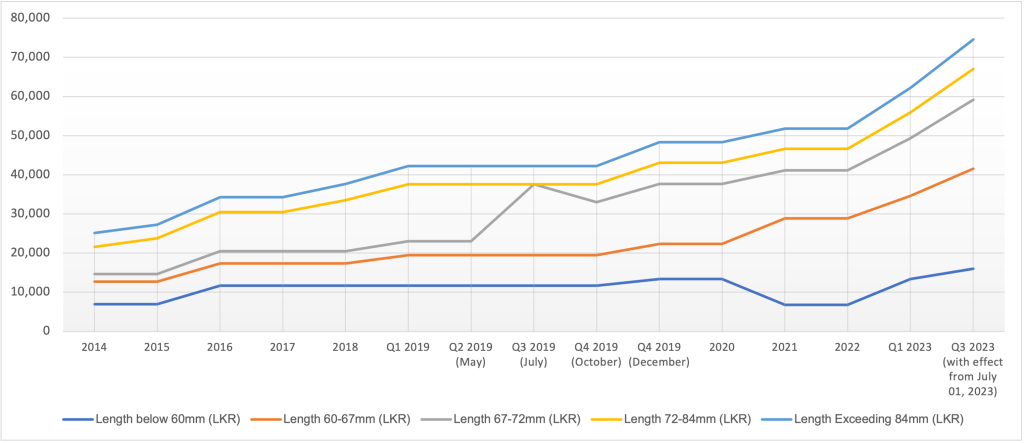
Research Intelligence Unit (RIUNIT) continues its groundbreaking efforts in shedding light on critical policy matters concerning Sri Lanka's economic landscape. Their latest series of reports highlights the significance of illicit markets that operate within and beyond the island’s borders.
Focused on combating illicit markets and their impact on the nation's economy, RIUNIT's latest policy papers aim to guide sound policy decisions crucial for bridging the country's revenue gap and fostering sustained economic development.
RIUNIT's policy papers published in 2023 revealed a significant surge in the illicit tobacco sector, with illicit cigarette market share climbing from 16% in 2022 to 29%. Also, 62% of Tendu leaves used for beedi manufacturing appear to be smuggled. These increases in illicit trade are causing substantial revenue losses for the government. From the trade of illicit cigarettes alone, the revenue loss to the Government stood at a staggering LKR 79 billion.
Additionally, RIUNIT found a considerable gap in tax revenue generated by different tobacco products like beedi, relative to their volumes.
Despite beedi holding a 67% market share in the total tobacco market, they only contribute around LKR 4 billion in tax revenue, representing a mere 3% of total tax revenue from the tobacco market.
RIUNIT's research indicated that the government implemented substantial increases in excise taxes on legal cigarettes in recent years, ranging from around 44-137% in 2023 alone. These tax hikes stretched consumer affordability and played a crucial role in causing consumers to shift towards cheaper illicit cigarettes.
Excise tax revisions 2014-2023

Source: RIUNIT compilation based on Ministry of Finance
In addition, the rising cost of legal cigarettes became a strong incentive for consumers to seek more
affordable options, often turning to illicit cigarettes. Furthermore, the ongoing decrease in real wages
during this period significantly affected the affordability of legal cigarettes, making the illicit market
even more appealing. Faced with economic challenges, many consumers sought more cost-effective
alternatives, resulting in a noticeable increase in the consumption of illicit cigarettes.
RIUNIT's report which centered on examining the economic and agricultural repercussions subsequent
to the recent ban on the herbicide 'glyphosate’ was also officially presented on the day. The report broke
into the impacts resulting from the restrictions imposed on both the import quantities and usage of this
herbicide. According to RIUNIT's estimations, roughly 1,156 metric tons of glyphosate found their way
onto the island through smuggling in 2020. If these quantities were to be considered legitimate sales, the
potential tax revenue for the year 2020 could have amounted to around LKR 295 million. Additionally,
the unregulated presence of smuggled or counterfeit weedicide products in the market poses substantial
threats to the environment, farmers, and the food safety for consumers, warranting significant concern.
At a juncture where Sri Lanka seeks to increase tax revenue amidst pressures from the IMF and the all-
important need to stabilize the national economy, RIUNIT highlights the pivotal role of tackling illicit
markets to safeguard the government's financial stability. Targeting key policymakers critical in steering
the country's economic trajectory, RIUNIT's focus encompasses drivers and impacts of illicit markets
related to agriculture, alcohol, tobacco, and counterfeit goods.
Mr. Roshan Madawela, CEO of RIUNIT Sri Lanka, emphasized the importance of addressing the
significant fiscal deficit prevalent in Sri Lanka. He highlighted the indispensable need to tackle illicit
trade that causes significant revenue loss to the State, and is crucial to ensure the country's financial
stability. He added that addressing the leakages in the tax system should be addressed as a matter of
priority rather than shifting the entire tax burden on working people.
The most recent discoveries outlined in the illicit markets policy papers were introduced by the
Research Analyst of RIUNIT, Mihin Perera, and the reports were presented to the Chief guest Hon.
Shehan Semasinghe, State Minister of Finance. Following the report launch, an in-depth panel discussion
took place, featuring the CEO of Sri Lanka Institute of Taxation, Major General (Retd) G. Vijitha
Ravipriya; Chairperson of the Advocata Institute, Murtaza Jafferjee; Director of the Construction
Industry Development Authority, Dr. Chithra Weddikkara and the Finance Director of Heineken Lanka
(Pvt) Ltd, Samanthi Kariyawasm, as panelists.

